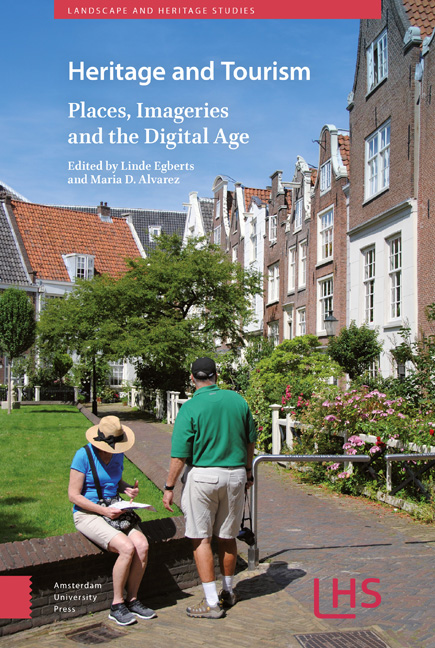Book contents
- Frontmatter
- Dedication
- Contents
- List of Figures and Tables
- Foreword
- 1 Tourism and Heritage: Crafting Experiences Through Innovation
- 2 Tourism Conflicts and Conflict Tourism: Curating “Holoscapes” in Europe’s Age of Crisis
- 3 Heritage Landscapes of Hiroshima and Nagasaki
- 4 Revealing and Presenting the Past(s) for the Public: Fethiye Mosque and Museum as a Cultural Heritage Site in Istanbul
- 5 Who Takes the Lead in Initiating Cooperation in a Cultural Network and Why?: The case study of a Rural Finnish Destination
- 6 Sustainability of Heritage-Tourism Destinations: A Demand-Based Perspective on Cusco, Peru
- 7 Localising National Tourism Websites: The case of World Heritage sites
- 8 Enhancing the Tourist Heritage Experience through “In-Situ”, Customisable, 3D-Printed Souvenirs
- 9 Tracking the Heritage Tourist: Heritage tourism and Visiting Patterns in a Historic City
- 10 The Construction of a Tourist-Historic Icon: The case of the Palace of Westminster, London
- 11 Conclusion
- Index
2 - Tourism Conflicts and Conflict Tourism: Curating “Holoscapes” in Europe’s Age of Crisis
Published online by Cambridge University Press: 22 December 2020
- Frontmatter
- Dedication
- Contents
- List of Figures and Tables
- Foreword
- 1 Tourism and Heritage: Crafting Experiences Through Innovation
- 2 Tourism Conflicts and Conflict Tourism: Curating “Holoscapes” in Europe’s Age of Crisis
- 3 Heritage Landscapes of Hiroshima and Nagasaki
- 4 Revealing and Presenting the Past(s) for the Public: Fethiye Mosque and Museum as a Cultural Heritage Site in Istanbul
- 5 Who Takes the Lead in Initiating Cooperation in a Cultural Network and Why?: The case study of a Rural Finnish Destination
- 6 Sustainability of Heritage-Tourism Destinations: A Demand-Based Perspective on Cusco, Peru
- 7 Localising National Tourism Websites: The case of World Heritage sites
- 8 Enhancing the Tourist Heritage Experience through “In-Situ”, Customisable, 3D-Printed Souvenirs
- 9 Tracking the Heritage Tourist: Heritage tourism and Visiting Patterns in a Historic City
- 10 The Construction of a Tourist-Historic Icon: The case of the Palace of Westminster, London
- 11 Conclusion
- Index
Summary
Abstract
The notion of a European heritage has become one of the main pillars of the EU's cultural policy. However, instead of the political wish for a European shared patrimony, Europe faces a highly conflicted past, which has become for many Europeans a contested heritage with strong repercussions for the backward-looking notion of European culture. For, there is no heritage without culture and no culture without conflict. One's heritage also defines one's identity, and the willingness of Europeans, and “Western” tourists more in general, to identify with deplorable and painful pasts makes Holocaust heritage tourism into a kind of healing experience. More than being a matter of shared values, the conservation of such painful pasts deals with their present uses. In other words, the meaning of heritage is produced by politics of memory and identity as much as by the performative experience of heritage tourists and other stakeholders with often conflicted interests and competing memories. This has resulted in many parts of Europe (and beyond) in what I would call urban “Holoscapes”, where visitors now walk in the footsteps of victims in a virtually re-enacted site without Jews.
Keywords: conflict, heritage, tourism, Holoscapes, Europe
A curator mouldering the concrete remnants of the ruins of the gas chambers and crematoriums of Auschwitz-Birkenau in his hand to show the material decay of Europe's most horrible past, is taken as the opening scene of Oeke Hoogendijk's documentary film The Holocaust Experience (2002). A single shot of the dust, blowing away like the ashes of the victims of the Nazi death camp in the past, shows in a nutshell the uselessness of the daily struggle of the Polish State Museum Auschwitz-Birkenau to preserve the most iconic remnants of the Holocaust. “Here everything should stay the same”, as one of the masons remarks while restoring the concrete piles of the former German Nazi concentration camp, but we all know that it would not. Yet the same documentary presents another way to keep the memory of the Holocaust alive.
- Type
- Chapter
- Information
- Heritage and TourismPlaces, Imageries and the Digital Age, pp. 31 - 54Publisher: Amsterdam University PressPrint publication year: 2018



